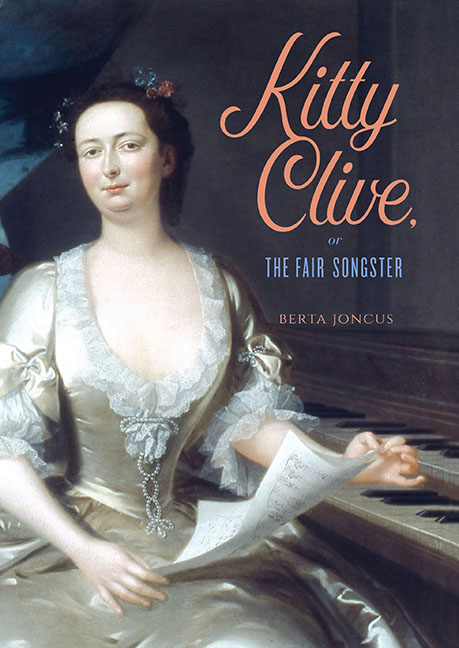Book contents
- Frontmatter
- Dedication
- Contents
- Illustrations
- Preface
- Conventions of Transcription
- 1 The Siren Song: Kitty Clive in the Playhouse
- 2 ‘The Lovely Virgin tun'd her Voice’: Henry Carey and the Production of a Native Songster
- 3 ‘Charm'd with the sprightly Innocence of Nell’: The Metamorphosis of Miss Raftor
- 4 ‘HINT writes, and RAFTOR acts in Drury-lane’: Clive, Fielding, and Theophilus Cibber
- 5 ‘The pious Daughter, and the faithful Wife’: Fielding, Miller, and Clive, 1733–35
- 6 ‘A Likeness where none was to be found’: Contested Images of Clive, 1734–37
- 7 The Patriot Soprano: British Worthies at Drury Lane
- 8 Handel and the Sweet Bird of Drury Lane, 1740–43
- 9 The Case of Mrs. Clive
- 10 Of Scuffles and Rivalries: The Demise of ‘Kitty Cuckoe’
- 11 From Miss Lucy to Mrs. Riot: Voice and Caricature
- 12 Clive on Clive: The Rehearsal: Or, Bays in Petticoats
- 13 Conclusion: The Fair Songster
- Appendix 1 Catherine Clive's Roles 1728–69
- Appendix 2 Lines in Catherine Clive's Repertory 1728–69
- Appendix 3 The Case of Mrs. CLIVE (1744)
- Select Bibliography
- Index
2 - ‘The Lovely Virgin tun'd her Voice’: Henry Carey and the Production of a Native Songster
Published online by Cambridge University Press: 20 September 2019
- Frontmatter
- Dedication
- Contents
- Illustrations
- Preface
- Conventions of Transcription
- 1 The Siren Song: Kitty Clive in the Playhouse
- 2 ‘The Lovely Virgin tun'd her Voice’: Henry Carey and the Production of a Native Songster
- 3 ‘Charm'd with the sprightly Innocence of Nell’: The Metamorphosis of Miss Raftor
- 4 ‘HINT writes, and RAFTOR acts in Drury-lane’: Clive, Fielding, and Theophilus Cibber
- 5 ‘The pious Daughter, and the faithful Wife’: Fielding, Miller, and Clive, 1733–35
- 6 ‘A Likeness where none was to be found’: Contested Images of Clive, 1734–37
- 7 The Patriot Soprano: British Worthies at Drury Lane
- 8 Handel and the Sweet Bird of Drury Lane, 1740–43
- 9 The Case of Mrs. Clive
- 10 Of Scuffles and Rivalries: The Demise of ‘Kitty Cuckoe’
- 11 From Miss Lucy to Mrs. Riot: Voice and Caricature
- 12 Clive on Clive: The Rehearsal: Or, Bays in Petticoats
- 13 Conclusion: The Fair Songster
- Appendix 1 Catherine Clive's Roles 1728–69
- Appendix 2 Lines in Catherine Clive's Repertory 1728–69
- Appendix 3 The Case of Mrs. CLIVE (1744)
- Select Bibliography
- Index
Summary
Enter Catherine Raftor – Carey as composer and teacher – Clive's hybrid voice – pretty Polly Fenton swoops in – Colley Cibber tries to tame Town taste – the shepherdess ‘Miss Rafter’ – Phillida lingers, but Arethusa is cut down – from swains to gods, or traversing musical spheres – Procris prevails
When she auditioned for Drury Lane, Catherine Raftor reportedly bowled over veteran manager Colley Cibber. The audition took place some time before 13 April 1728, when she apparently debuted on stage. More than twenty years later, Drury Lane prompter William Chetwood would recall:
Miss Raftor had a facetious Turn of Humour, and infinite Spirits, with a Voice and Manner in singing Songs of Pleasantry peculiar to herself. Those Talents Mr. Theo. Cibber and I (we all at that Time living together in one House) thought a sufficient Pasport to the Theatre. We recommended her to the Laureat [Colley Cibber] … and the Moment he heard her sing, [he] put her down in the List of Performers at twenty Shillings per Week. But never any Person of her Age flew to Perfection with such Rapidity … like a Bullet in the Air, there was no distinguishing the Track, till it came to its utmost Execution.
Chetwood's 1749 account is the earliest we have of Clive's career. A year later, in a theatre memoir for Dublin readers, Chetwood noted that ‘her teacher in music was the luckless Henry Carey and we find her furnishing her talent to entertainments given for his benefit on several occasions’. Chetwood's admiration of Clive tinges all his writings about her, and seems to have been shared by many of the Irishmen with whom she worked. By 1740 not only Chetwood, but also Charles Coffey and James Quin, had helped boost her career. Chetwood had ties to Kilkenny and was probably from there, like Clive's father.
In early 1728, two people badly needed Clive employed at Drury Lane: Colley Cibber and Henry Carey. Drury Lane nominally had three managers, but Cibber had in fact been running the business since the early 1720s, competing hard against his rival John Rich, the manager of London's only other licensed playhouse. In the autumn of 1727 Cibber had made a bad decision, rejecting The Beggar's Opera when John Gay offered it to him.
- Type
- Chapter
- Information
- Kitty Clive, or the Fair Songster , pp. 28 - 63Publisher: Boydell & BrewerPrint publication year: 2019

